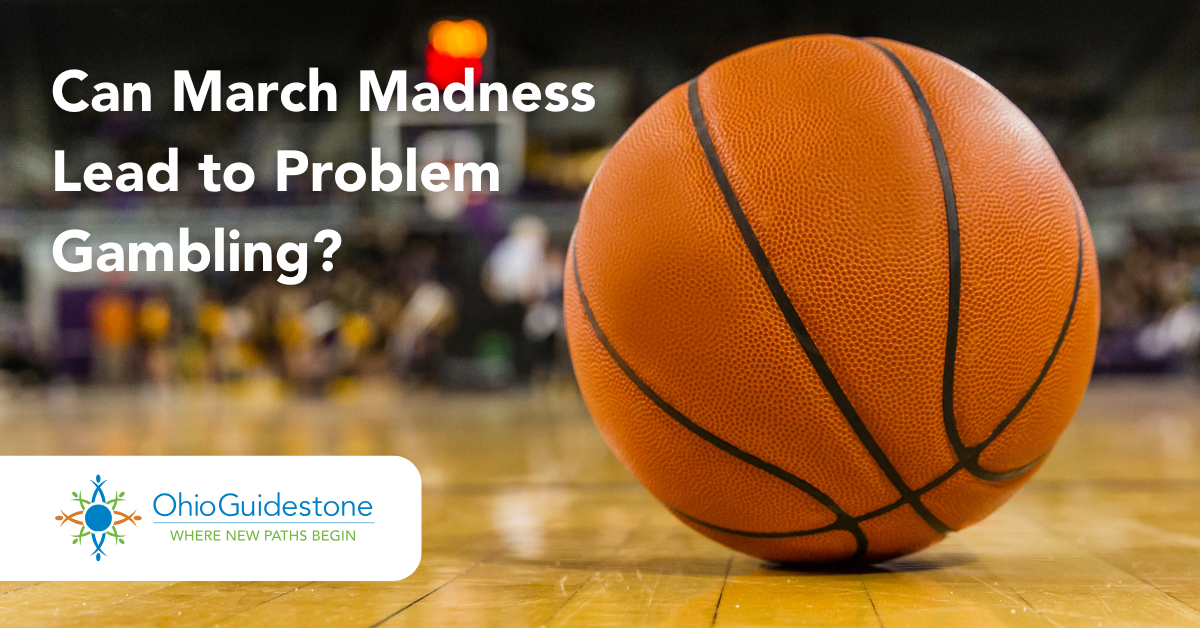Can March Madness Lead to Problem Gambling- 3 Ideas to Consider

Can March Madness Lead to Problem Gambling? – 3 Ideas to Consider
March is Problem Gambling Awareness Month for a good reason. Gambling in general can exacerbate existing mental health issues, leading to increased stress, anxiety, and depression.
Table of Contents
Gateway to problem gambling?
- High Stakes and High Emotions: The emotional highs and lows of March Madness can drive people to place more bets in an attempt to recapture the thrill or recover losses. This emotional rollercoaster can lead to impulsive decisions and increased risk-taking.
- Easy Access and Social Pressure: With the rise of online betting platforms, placing a bet has never been easier. Online betting apps are easy to use and can be anonymous.
- Normalization of Gambling: The widespread normalization of gambling within sports culture, during events like March Madness, can desensitize the risks involved in gambling.
1. High Stakes and High Emotions- The Allure of Betting on March Madness
March Madness is one of the most thrilling times of the year for college basketball fans. The excitement of the NCAA tournament, with its buzzer-beaters, Cinderella stories, and intense rivalries, captivates millions. However, alongside the joy and camaraderie, there’s a darker side that often goes unnoticed: the potential for problem gambling.
The sheer volume of games and the unpredictable nature of the tournament make March Madness a prime target for sports bettors. According to the American Gaming Association, American adults wagered an estimated $2.72 billion on the men’s and women’s tournaments combined in 2024.
This staggering amount highlights the widespread appeal of betting on March Madness.

2. Easy Access and Social Pressure
Online betting has undeniably changed the landscape of March Madness. With the rise of online betting platforms, placing a bet has never been easier. Betting apps are easy to use and can be anonymous, which may allow underaged participants to use a fake profile.
Even social gatherings and office pools can create a sense of peer pressure, encouraging individuals to participate in betting even if they wouldn’t normally do so.
3. Normalization of Gambling
The widespread normalization of gambling within sports culture, during events like March Madness, can desensitize the risks involved in gambling.
While online apps have made betting more accessible and greatly increased fan engagement, it also comes with a downside concerning problem gambling. As the popularity of online betting continues to grow, it’s crucial for individuals to understand the mental health risks associated with gambling. Prevention of problem gambling and education about betting responsibly need to be a priority to protect consumers.
Chasing Losses:
One of the hallmarks of problem gambling is the compulsion to chase losses. During March Madness, the rapid succession of games provides ample opportunities for individuals to try to win back lost money, often leading to a vicious cycle of betting and losing
A NCAA Survey in 2023 showed that 6% of U.S. college students have a serious gambling problem, and 1 in 5 college students have used their financial aid to gamble.
Recognizing the Signs of Problem Gambling
It’s crucial to recognize the signs of problem gambling early. These can include:
- Preoccupation with gambling and constantly planning the next bet.
- Needing to gamble with increasing amounts of money to achieve the same thrill.
- Trying to control, cut back, or stop gambling without success.
- Gambling to escape problems or relieve feelings of helplessness, guilt, anxiety, or depression.
- Lying to family members or others to hide the extent of gambling
- Neglecting Responsibilities: Ignoring work, school, or family obligations in favor of gambling
- Mood Swings: Experiencing significant mood swings, including feelings of euphoria when gambling and depression when not
- Financial Problems: Accumulating debt, borrowing money, or selling possessions to fund gambling activities.
- Bailing Out: Frequently asking others for money to cover gambling losses or financial troubles caused by gambling
Taking Steps to Prevent Problem Gambling
- Set Limits: Establish a budget for how much you’re willing to spend on betting and stick to it.
- Seek Support: Talk to friends or family about your gambling habits. If needed, seek professional help from organizations that specialize in gambling addiction.
- Stay Informed: Educate yourself about the risks of gambling and the signs of addiction. Awareness is the first step towards prevention.
Can March Madness lead to problem gambling?
While it is a time of excitement and celebration, yes, March Madness can lead to problem gambling. It’s important to be mindful of the potential risks associated with gambling. But by recognizing the signs of problem gambling and taking proactive steps to prevent it, we can ensure that the joy of the tournament remains unmarred by the darker side of betting.
OhioGuidestone Can Help
If you or someone you know is struggling with gambling addiction, don’t hesitate to seek help. OhioGuidestone has therapists who are endorsed by the Problem Gambling Network of Ohio and certified to educate and prevent problem gambling. OhioGuidestone therapists can help both the individual and family in managing problem gambling.
OhioGuidestone in New Philadelphia is a provider for the National Gambling hotline (1-800-GAMBLER) through which individuals can be directly linked to OhioGuidestone problem gambling services. You can also call the direct Crisis Line at 330.364.1374.
To read more about comfort-seeking behavior check out our blog post on the 3 basic levels of comfort.
